Baptist Union Council: March 2023
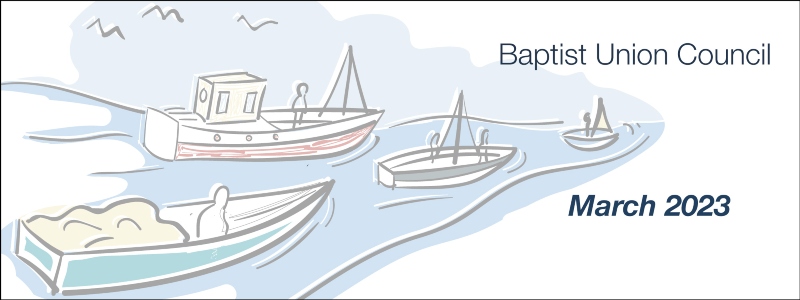
Baptist Union Council took place 21-22 March at the Hayes Conference Centre in Swanwick, Derbyshire.
The gathering was grounded in worship and prayer. Worship was led over both days by Nathan Toseland, a regional minister with the Central Baptist Association (CBA). Council members spent Tuesday evening praying for the life and work of our Union, and communion was shared on Wednesday, presided over by Maureen Hider and Andrew Openshaw, both of the CBA.
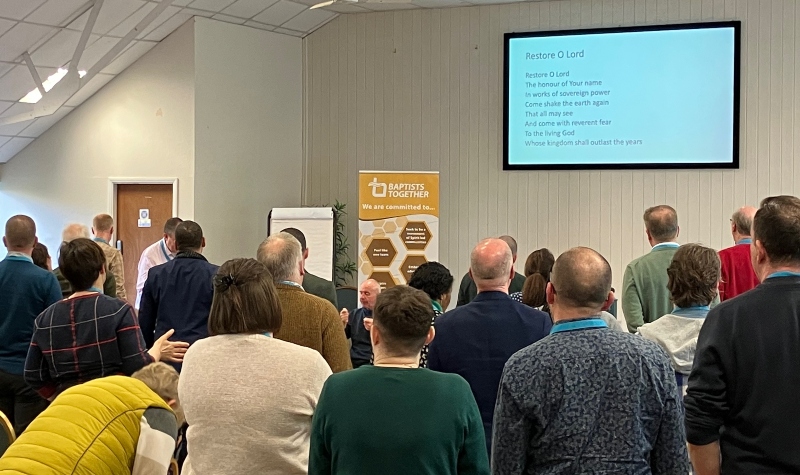
Scroll down for the following reports:
-
Tricordant – Financial Model Review
-
Marriage and accredited ministry - consultation update
-
New recognition category for local leaders - RLM
-
New churches and church closures
-
Change our narrative!
-
Finance update
-
Pensions
-
Baptists Together Key Roles Nominations Team
-
Young adults and mission
Tricordant – Financial Model Review
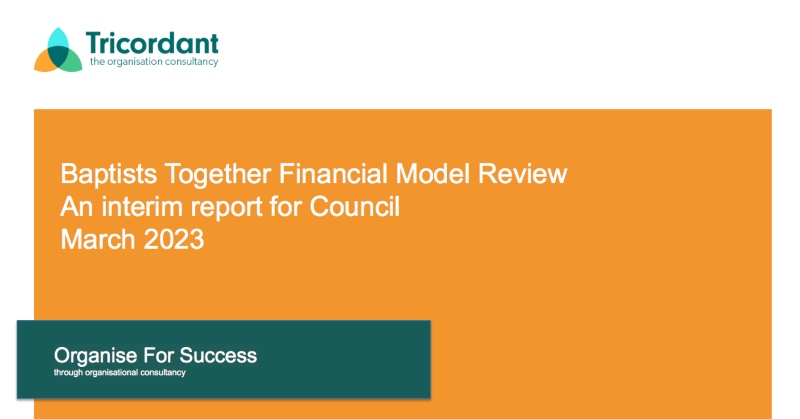 Tuesday afternoon was devoted to receiving the next stage of the Financial Model Review, and agree a series of proposals to continue further exploration.
Tuesday afternoon was devoted to receiving the next stage of the Financial Model Review, and agree a series of proposals to continue further exploration.
The session and proposals were presented by John Taylor of Tricordant, the independent consultants commissioned to undertake a Financial Model Review of Baptists Together.
The review was initiated by Council due to our declining income along with continued tensions as to whether the current system is fair.
Tricordant presented the first phase of the review at March 2022 Council, where three recommendations were offered and approved.
In a briefing paper for members for this Council, John explained that for Baptists Together to survive as a movement, ‘brave, unified decisions’ - in which people give ground - need to be made.
‘There is a potential opportunity for you to make bold decisions to create a positive future. Decisions made by this generation of leaders will impact future generations,’ the report stated.
‘There are polarised views and tensions across Baptists Together that potentially stop change in its tracks - without this your future is seriously endangered.’
The report was accompanied by a theological briefing paper from Baptist college principals.
The reality is that we face some serious financial challenges, the report stated:
-
Membership and attendance are declining
-
Home Mission giving (operational income) in total is declining
-
Funds cover of expenditure is dangerously low for some Associations
-
The real challenges are income generation and equity across Associations
Some ‘radical structural thoughts’ were taken to Core Leadership Team in January, along with a ‘no punches pulled assessment of the brutal facts facing Baptists Together.’
Tricordant had discovered an appetite for structural change, but no consensus on how this could be done.
The working group then met for an evening and full day at Spurgeon’s College on 2/3 March ahead of Council. The focus was to develop proposals ‘that will bring hope’.
John subsequently presented the proposals to Council (pictured). He said, ‘I’m very conscious this is all about giving churches the best support they need, and putting the right structures in place. It’s how you manage your independence and your interdependence.
‘Ultimately, this is all about growing the Kingdom of God.'
The same old thinking will lead to the same results, he continued. ‘So, the question for today – are you ready for something different?’
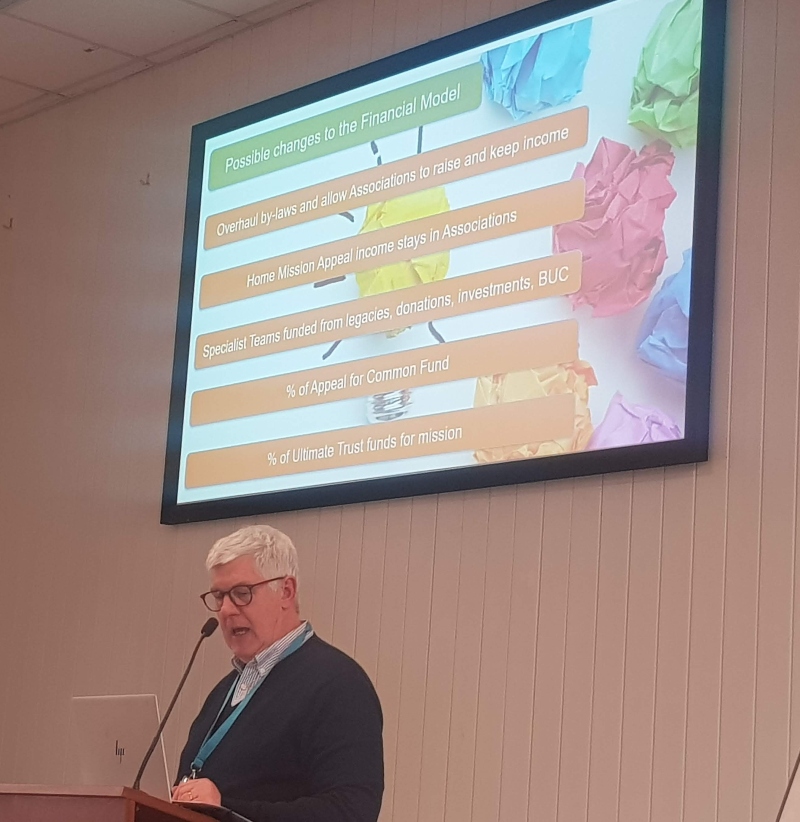 The possible changes he invited Council to consider were:
The possible changes he invited Council to consider were:
-
Overhaul bylaws and allow Associations to raise and keep income
-
Home Mission appeal income stays in Associations
-
Specialist Teams funded from legacies, donations, subscriptions, investments, Baptist Union Corporation
-
A percentage of appeal money should go to the Common Fund and be used to support less well off Associations
-
A percentage of Ultimate Trusts go into a fund for mission
John made clear that no calculations had yet been done: these were initial ideas. He was asking for general feedback on them, and permission to carry out the detailed work and calculations required to make an informed decision on whether we take the proposals further.
Council members were invited onto tables to discuss the strengths, weaknesses, opportunities and threats of each possible change. They were asked to raise anything significant the working group needs to reflect upon further. Each table then shared the key points of its discussion.
Some questioned whether this was something Associations had the capacity to do themselves. Others suggested there was potential for greater collaboration and closer identification with the local. The point was made that adopting these proposals would move us away from the Acts 2 model we currently operate - everything to the centre, and then distributed; from a Union to a federation of Associations.
The second half of the session began with John reiterating this was about ‘collaboration, working together, how you pool resources to get the change you need. It isn’t necessarily all about finances – but you do need mission. A lot of this is about how you fund mission.’
He added across Baptists Together there are some ‘really anointed and skilled people’. How does the whole of Baptists Together benefit from them?
‘In the theological paper, it talks a lot about interdependence,’ John continued. ‘Is there a way you can work much closer together, share your anointing?’
There followed a plenary session where Council members were able to share their personal views and any other observations.
The session concluded with a vote on whether the working group should carry out detailed work on the five possible changes highlighted above. The motion was passed.
Marriage and accredited ministry - consultation update
Members were given an update to the consultation process to enable Council to respond to a request to change the Ministerial Recognition Rules (MR) to make it possible for ministers to be in a legal Same Sex Marriage and be accredited.
A series of proposals regarding the consultation process were agreed at the last Council meeting.
Since then a Consultation Steering Group (CSG) was formed, and a research project brief was finalised.
Five suppliers were approached and invited to offer proposals for working on the consultation. Four bids were received.
Following the shortlisting meetings, the CSG was 'unanimous' in appointing Sandra Cobbin and Associates (the Revd Bev Thomas, Dr John Tomlinson, the Revd Fiona Tweedie of Brendan Research, and Stephen Ruttle KC), the Council agenda paper stated.
'They bring a wealth of professional expertise, together with good awareness of Baptist ecclesiology and a realistic grasp of the challenges of delivering this project within our timeline. Their team includes gender and racial diversity and we felt that this was important.
'They also demonstrated an appreciation of the challenges and risks associated with a project like this and the organisational and pastoral sensitivities involved.'
Council members heard Sandra's group will carry out a pilot before sending out the survey in May. They will also have a presence at the Baptist Assembly in June. The initial plan was for the consultation to end in July, with the results analysed in August, reported to CLT in September and then back to Council to answer the question in October.
However, Council members were invited to consider whether this timetable needed an extension, amid concerns the proposed timeline was too tight and didn’t leave sufficient time for churches and ministers to engage with the survey. They were presented with a list of pros and cons. An extension would allow for more to be heard, and six Associations would prefer one.
On the other hand, no extension would allow us to stick to what we agreed and communicated in October; and there are risks to delaying further. Two Associations would like to stick with the current plan; five are neutral or undecided. Either way, there is 'some anxiety, confusion, and polarisation,' said Joth Hunt, regional minister team leader South East Baptist Association, who presented the session.
The issue was discussed around tables, with each feeding back their key points. Members were asked to reflect overnight before making a decision on Wednesday, where there was further discussion.
A vote for the extension was carried. The results of the consultation will now be brought to Council in March 2024.
A message was subsequently sent to all our ministers and churches on 24 March. It stated, 'Council wants to ensure that we can facilitate a good consultation process and enable as many people to participate as possible. We are still aiming for the Consultation to be open at the end of April but it will now run into the autumn.'
There is also a dedicated area on the Baptists Together website to keep you informed of the Consultation: baptist.org.uk/consultation
New recognition category for local leaders - RLM
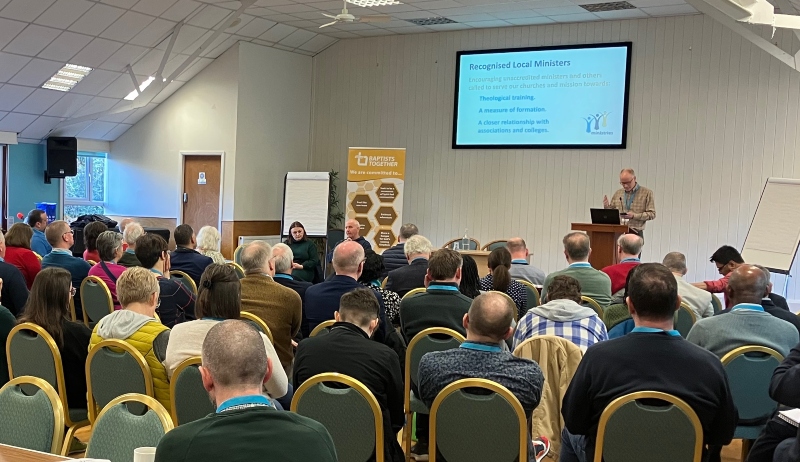
A new national recognition category for local (or lay) Baptist leaders - that of Recognised Local Minister (RLM) - was approved by Council members.
It is anticipated this category will provide a framework for the training and recognition of 'a broader range of ministries than the current national recognition', such as church pastors, pioneers, volunteer or community chaplains, evangelists or children’s, youth and families’ workers.
It will therefore replace the existing categories of Nationally Recognised Pastor, Pioneer, and Preacher.
The changes were sought by the Ministerial Recognition Committee (MRC) and presented to Council by Tim Fergusson, Ministries Team Co-Leader.
A review group set up by the Ministries Team to look into the Baptist Training Partnership (lay training offered by our colleges) believes a change is necessary to better reflect what's happening on the ground.
The current categories favour the pastor/preacher well, Tim explained, but the 'real prize’ is to offer a broader range of opportunities to those exercising spiritual oversight in different ways. Tim added this was 'more than leadership – it’s about theology and spiritual formation.'
The review group established that Baptists Together should collectively offer:
-
A palette of high-quality training suitable for many different types of local leaders; that was both flexible to take into account different ministry settings, and formational so that it 'inculcates the character and behaviours appropriate to missional disciples rather than merely imparting knowledge and developing skills.'
-
Some form of widely understood recognition for those who complete an agreed programme of training.
The review group settled on the new category title, Recognised Local Minister, after some deliberation. Each word is carefully chosen. An RLM is:
-
a ‘minister’ because they are entrusted by a Baptist church with the spiritual oversight of that church and/or the mission that emerges from it;
-
‘local’ because it is their fitness to serve their particular ministry setting that is recognised. Their training aims to enable them to serve that setting;
-
‘recognised’ because, a) they have completed a curriculum of formational training that is common across Baptists Together and, b) because their call, character and competence has been tested and affirmed by their regional MRC.
The recognition is therefore awarded regionally but against a nationally agreed standard.
In addition to the programme of learning, those seeking RLM status would receive mentoring over a two-year period, arranged by their association; and join a spiritual formation group over the same period, organised by either the Association or the college or both in partnership with each other.
The report accompanying the proposal stated the language of Recognised Local Ministry avoids the words ‘lay’ and ‘laity’ which are usually used to contrast with ‘clergy’. 'Rather, the preferred distinction is between accredited ministers and local leaders,' it said. The training roughly relates to A-level standard, and Recognised Local Ministry 'validates those local leaders who have undergone a measure of training and formation to equip them for their local role.'
Council members voted on three proposals:
-
To close entirely the category of Nationally Recognised Preacher
-
To close the categories of Nationally Recognised Pastor and Pioneer to new applicants
-
To make possible a new category of Recognised Local Minister
A plenary discussion highlighted members' general support for the proposals which were approved overwhelmingly.
There is ‘considerable detail behind the proposal for Recognised Local Ministry, which has been seen by and refined through discussion with the colleges, the association team leaders and national MRC’, the paper stated.
It is hoped training for Recognised Local Ministry will be available from this autumn.
The 74 existing Nationally Recognised Pastors will retain their status unless they wish to transfer to become an RLM, Tim later clarified. Similarly, those presently in training will complete as Nationally Recognised Pastors unless they wish to adopt the new category title. Council were concerned to honour the work of the 68 existing Nationally Recognised Preachers, but appreciated that MRC felt that maintaining and publishing a national register no longer serves a purpose sufficient to justify its administration. (There are no Nationally Recognised Pioneers.)
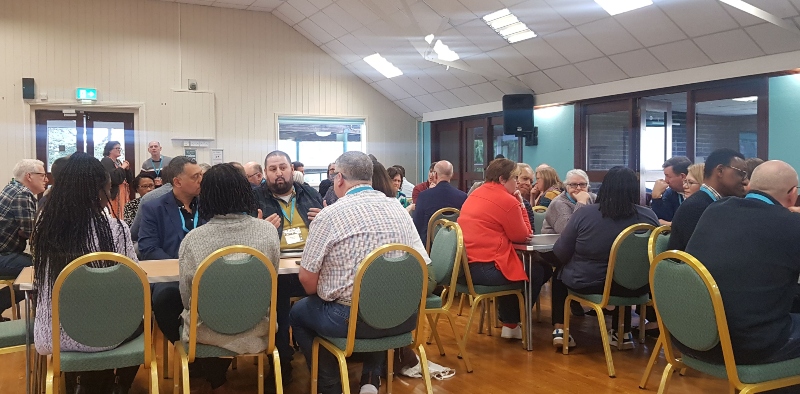
New churches and church closures
Four new churches were welcomed and prayed for by Council.
They are:
-
Whitehouse Church, Milton Keynes (CBA)
-
Carmel Church (SWaBA)
-
Christ Victory Baptist Church, Nottingham (EMBA)
-
Acoustic84 Communities (SCBA)
Council members were informed two churches had ceased membership of BUGB:
-
Emmanuel Shared Church LEP, Ware (CBA) (Church continuing as Anglican only)
-
Winton Korean Church (SCBA) (subject to SCBA Trustees meeting on 15 March)
There were seven closures:
-
Thurleigh United Church LEP (CBA)
-
Clayhall Baptist Church (LB)
-
St George’s Street Baptist Church, Macclesfield (NWBA)
-
Stratford Road Baptist Church(HEBA)
-
Chipperfield Baptist Church (CBA)
-
Trinity Church LEP, Keighley (YBA)
-
Wesley Road LEP, Leeds (YBA)
Three name changes:
-
St Austell Baptist Church to White River Community Church (SWBA)
-
South Shields Baptist Tabernacle to Marsden Road Baptist Tabernacle, South Shields (NBA)
-
Central Ecumenical Church, Maesteg LEP to Bethel Central Church, Maesteg (SWaBA) (Church no longer an LEP, continuing as Baptist only)
And two amalgamations:
-
Coastlands Church (formerly Peacehaven) and Seaford Baptist Church to operate as Seaford Baptist Church (SEBA)
-
Castle Donington Baptist Church and Castle Donington Community Church to form Castle Donington Baptist Church (EMBA)
Each church was prayed for by Council moderator Seidel Abel Boanerges.
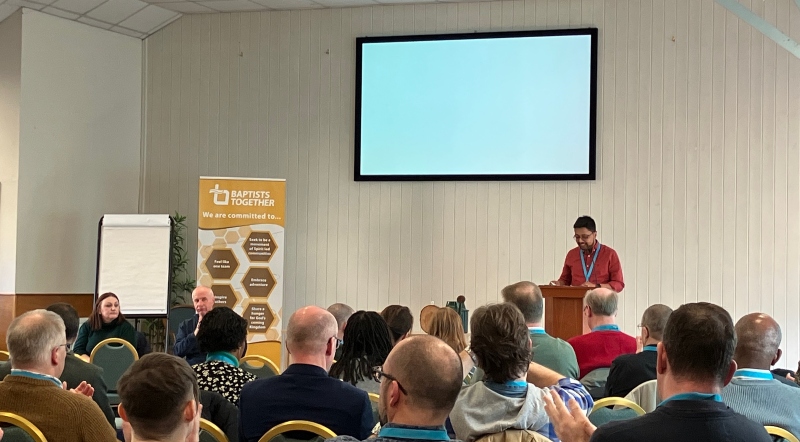
Change our narrative!
Later in the day Carl Smethurst, regional minister with the South West Baptist Association, shared short videos of Carmel Church, and another two churches welcomed into our Union at the previous Council meeting in October (Ebbsfleet Baptist Church and Transform.Church.)
Carl explained that among the challenges our Union is facing, ‘the kingdom of heaven is breaking among us’, and ‘God is at work’.
All three churches were different expressions of Baptist community, responding contextually. Carmel is an established church in the Welsh Valleys, Ebbsfleet is based on a new housing estate, while Transform is a digital Baptist missional community.
In showing the videos and subsequently sharing prayer points from each of the churches highlighted, Carl encouraged Council members to focus on how God is still working through us.
‘God is inspiring us to do new and creative things, and we are seeing his kingdom come,’ Carl said.
‘So what stories are we telling? Are we allowing our narrative to be framed by the closed churches? That we are we eking it out to the very end?
'Or does God have more to do with us?'
He continued, ‘I’d love these stories to frame our narrative. My desire is to raise our eyes to heaven, and be inspired by these guys to the next season.
‘God will provide if we follow his vision. Let’s change our narrative!’
Carl shared prayer requests from each of the churches, before encouraging Council members to break into small groups to pray.
Finance update
In what was his last Council before his term as treasurer ends in the summer (see Key Roles Nominations section), John Levick gave a finance update. Unfortunately 2022 was a disappointing year in which our unrestricted income was £700k below budget.
The biggest influence on this was legacies, which came in at £48k for the year, compared with £1.15m in 2021.
In addition, the Home Mission appeal suffered a further decline, resulting in an overall deficit against budget of £221k.
'What are the reasons for this?', asked John. Numbers in many of our churches are falling. Five Associations, mainly towards the north increased their giving year on year while eight saw a fall. Four of those which saw an overall fall in giving increased their giving per member, 'indicating the impact of falling membership on Home Mission giving'.
The increased costs of running churches, particularly with the increase in energy bills, is another factor. John also mentioned that some churches have held back giving because of uncertainty about the consultation on ministry and marriage.
The Association Grant’s true-up formula has been applied, with a calculated ‘clawback’ from Associations of £428k from the 2023 funding. The clawback represents 14 per cent of the budgeted income for each Association. This has made life difficult for Associations, it was noted.
The one 'glimmer of hope' was investment income.
'Where do we go from here?' John asked. 'The current situation is not sustainable. We do have funds to cover the short term, but we are likely to face stopping some activities.'
John's terms as treasurer ends in August.
'I step down satisfied pensions debt has been addressed. My involvement with this predates my time as treasurer.
'But I’m disappointed Home Mission is still such a challenge.’
He ended by quoting Hebrews 10:23-25:
23 Let us hold unswervingly to the hope we profess, for he who promised is faithful. 24 And let us consider how we may spur one another on toward love and good deeds, 25 not giving up meeting together, as some are in the habit of doing, but encouraging one another—and all the more as you see the Day approaching.
Following sustained applause, John was prayed for by Diane Watts, Faith and Society Team Leader.
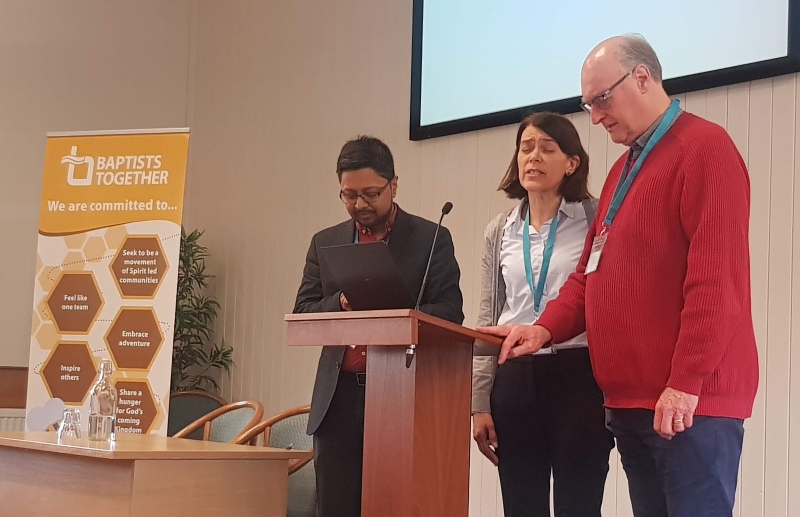
Pensions
John also updated Council on Pensions.
He firstly spoke about the Defined Benefit (DB) Scheme and the progress to buy-out. The biggest impact of the buy-out of the DB scheme is the separation of the DB from the Defined Contribution (DC) scheme. This will prevent members retiring being able to use their DC pot to draw down their 25 per cent tax free withdrawal and retaining a higher proportion in the DB fund. Just, our insurers, have been looking to provide a DC offering which will allow the DB and DC elements to be held together. To provide this Just need a pensions administration company which can do this. At the moment they are considering two companies and we await the outcome.
The other element which is most likely to impact the buy-out is the CBRE property fund investment held by the Pension Fund. This fund invests in a number of other property funds. CBRE announced a few years ago that it would wind up the fund and liquidate the investments. Progress has been slower than anticipated and has been further impacted by rising base rates which have hit the property market and reduced the value of the funds. We are hoping a good proportion of the remaining funds will come across as cash by the end of this year, but there is one holding where the cash will not come until 2026. We are looking at options which will enable us to maintain the buy-out date of mid 2024 despite the problem with the property fund. Between now and then there will be consultations, expected in the second half of this year.
The income and costs running up to buy-out remain uncertain but the central view is that there will be a surplus of £1.9m, John said. However on a cautious basis there could be a loss of £5.5m. It is for this reason that we are continuing to collect £1 per employer per month should it be necessary to raise extra funds from employers. The £5.5m does assume that everything moves in the wrong direction. We have already seen a number of changes in both the anticipated income and expenditure but the final figure has remained at the £1.9m
Work is nearly complete in dealing with the outstanding debts.
Like most DB schemes pension increases are RPI up to a maximum of 5 per cent. This is the rate in the Pension Fund rules. We have looked at an additional increase reflecting the current rate of inflation but until any surplus is certain there is no scope to fund an additional increase without asking churches for more funds.
John then turned to the Defined Contribution (DC) Scheme.
When the DB Scheme is bought out it will no longer be possible to share costs between the DB and DC Schemes. This will increase the cost of running the DC Scheme. Over the last couple of years we have had to produce a report for The Pension Regulator setting out the impact of the funds in the DC Scheme on climate change. While very worthy, we are reliant on information from the various fund investment managers. This work has cost the DC Scheme around an extra £50k, which is a large cost for a small Master Trust like ours. The regulator could ask for other work like this.
We are also aware that the Regulator wants to see fewer larger Master Trusts and we anticipate increased regulations which are more focused on the large trusts but we would have to adopt again at extra cost. We have started a piece of work using LCP, the pensions firm which administers the scheme, to identify our options. Their initial report has identified four potential ways forward of which two are worthy of further investigation.
Having received the report we have decided that in order to manage workload most of this review should be delayed until after the buy-out has been completed.
In the meantime we propose setting up a working party to review the scope of the DC Scheme. One particular aspect to look at is whether the DC Scheme can meet the needs of ministers not in churches, such as pioneers.
Baptists Together Key Roles Nominations Team
After a long search for a successor to John Levick, Rupert Lazar, who leads the Baptists Together Key Roles Nominations Team, was able to recommend a new treasurer to Council.
 Mohan Pandian is a chartered accountant with Ernst and Young where he became an associate partner in 2001 and a non equity partner in 2022. Born in Malaysia, he came to the UK in 1979, and has been attending Sudbury Baptist Church in Wembley following his conversion there at a mission event.
Mohan Pandian is a chartered accountant with Ernst and Young where he became an associate partner in 2001 and a non equity partner in 2022. Born in Malaysia, he came to the UK in 1979, and has been attending Sudbury Baptist Church in Wembley following his conversion there at a mission event.
He has served the church in a variety of roles, including as a deacon and treasurer. Outside of the church, Mohan served as a steward in Mission to London (Luis Palau), was a member of the working group reviewing the BU subscription model and also delivered a seminar for the Small Churches Connexion in London.
Mohan was the only person to express an interest in the role. The Discernment Group included John Levick, Andrew Cowley (Moderator of BUGB Trustee Board); with contributions from the former Support Services Team Leader Richard Wilson, who was involved in the early stage of the process.
Mohan was elected to the role unanimously.
Rupert said the Team would again like to express its thanks to John, who finishes his extended service in August.
Rupert also confirmed that Andrew Cowley has been appointed as Moderator of the Trustees Board. Andrew had been serving as Acting Moderator. At the last Council in October he said the voting may need to take place online if there was too big a gap until this Council; this indeed had happened, with Andrew’s appointment confirmed by an online vote in December.
 We also have a new moderator of the Ministerial Recognition Committee (MRC) after Council members voted to approve the team's nomination of Susan Stevenson. There were several expressions of interest in the role after the previous incumbent Sian Murray Williams stepped back, Rupert said.
We also have a new moderator of the Ministerial Recognition Committee (MRC) after Council members voted to approve the team's nomination of Susan Stevenson. There were several expressions of interest in the role after the previous incumbent Sian Murray Williams stepped back, Rupert said.
Susan has led Chatsworth Baptist Church in West Norwood, Blackheath and Charlton Baptist Church before a move to Wales. Here she served in university chaplaincy, in a Cardiff-based recovery community, as interim minister in a small Valleys’ chapel and as Associate Minister at Albany Road Baptist Church in Cardiff, before becoming a Regional Minister and finally Team Leader with the South Wales Baptist Association.
A personal profile in the Council papers stated ‘encouraging, enabling and supporting emerging leaders has always been a significant dimension of Susan’s ministry. One dimension of this ministry has been active involvement, both in London and South Wales, with MRC processes and mentoring programmes.’
Suzie Leveson and Shayla Waugh were also re-elected as Baptist Union trustees, having each finished their first term of three years of service on 31 August. Both had expressed their willingness to serve for a second term of three years, and the Key Roles Nominations Team supported this decision.
Council members voted unanimously to approve their re-election.
Young adults and mission
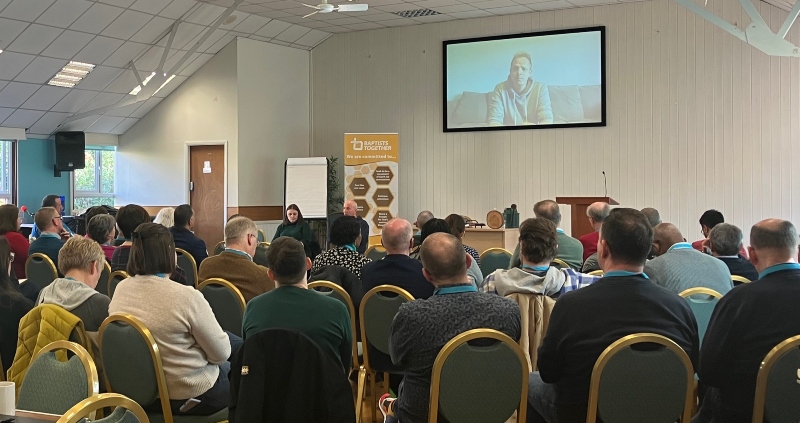 The final session at Council was devoted to young adults and mission, with a number of questions asked about how we are supporting them.
The final session at Council was devoted to young adults and mission, with a number of questions asked about how we are supporting them.
Young adults and mission have long been a national priority, said Andrew Ginn, a Baptist minister who is the Young Adults representative on the Core Leadership Team.
How might we bring a young adults’ lens to our decision making? For God is at work among our young adults; our millennials and Gen Z; – and ‘we need to work out what that looks like and how to join in.’
He encouraged Council members to think of an image of a tree. We need to consider our roots – our internships, our colleges and accreditation. The entire purpose of the roots is to support the branches, and the fruit.
Sandra Crawford, who leads Mission Forum, spoke of the need to protect new growth. ‘If God is doing a new thing, are we looking for it?
‘How do we hear and encourage the voice of young missional leaders, who may be doing something different?’
Council members were played a video featuring short testimonies from young adults in our movement.
Following the video, Clare Hooper, of the CYF Round Table, asked:
-
What did you notice?
-
What was unfamiliar?
-
What challenged you?
‘For some the stories are familiar; for others they won’t go far enough,’ she said.
Sandra then asked Council members another series of questions.
-
What is mine to do?
-
What do we do with the entrepreneur? Or are we looking for what’s gone before?
-
Are we helping ministers see there is a different way?
-
How do we best encourage and mentor young adults? What is ours to do as Baptists Together?
‘I do see God doing a new thing, in people and places,’ Sandra continued. ‘There is new stuff coming and we need to look at how we water and nurture it.’
Another series of video stories featuring young adults were shown.
Clare once again encouraged Council members to consider: what is your/our part to play?
Baptist Times, 29/03/2023